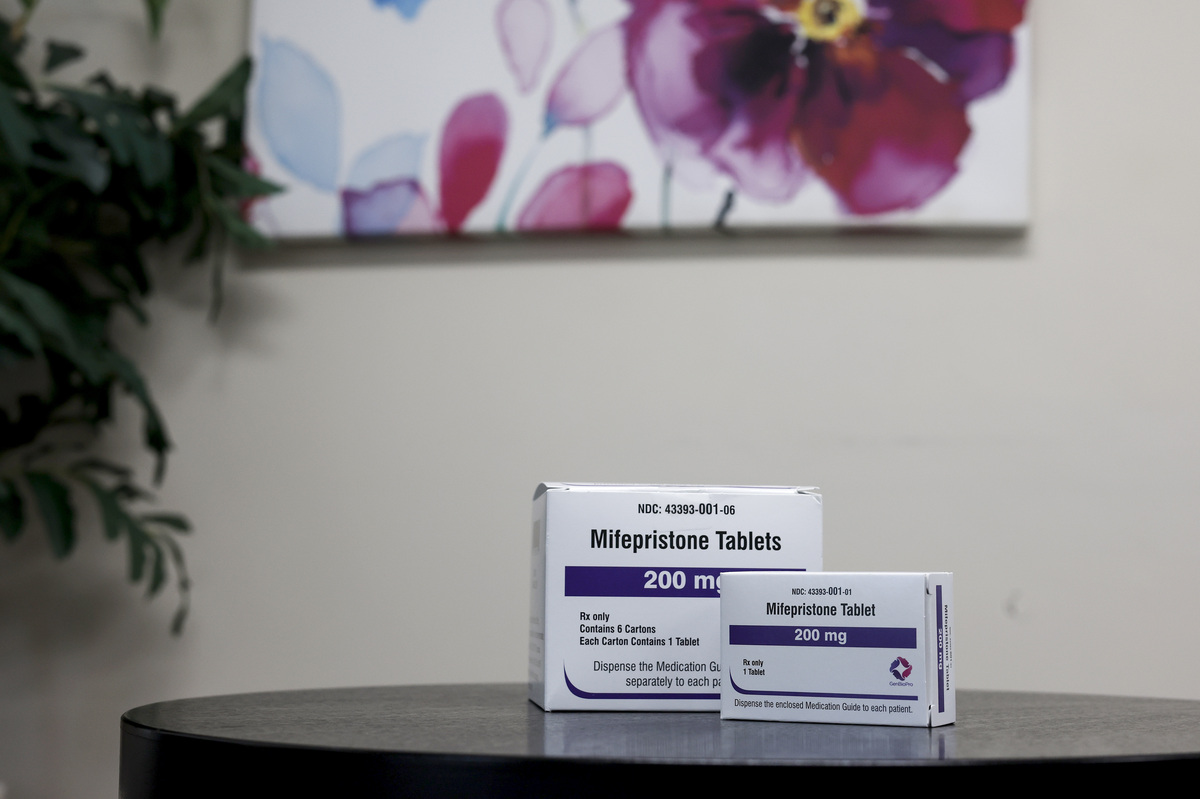On Wednesday, a federal appeals court heard arguments over access to mifepristone, a drug commonly used in a two-pill regimen to provide abortion and miscarriage care.
Anna Moneymaker/Getty Images
hide caption
toggle caption
Anna Moneymaker/Getty Images


On Wednesday, a federal appeals court heard arguments over access to mifepristone, a drug commonly used in a two-pill regimen to provide abortion and miscarriage care.
Anna Moneymaker/Getty Images
The legal battle over mifepristone, one of two medications used to provide abortions and treat miscarriages, continued Wednesday when a federal appeals court heard arguments about access to the drug.
The lawsuit over mifepristone dates to November 2022, when a group of abortion rights opponents filed a complaint alleging that the Food and Drug Administration had acted improperly when it approved mifepristone in 2000 and later expanded access to the drug by loosening regulations and allowing it to be dispensed via telehealth. Mifepristone is now used in more than half of abortions nationwide.
Over the course of two weeks in April, the immediate future of access to mifepristone was thrown in sudden jeopardy when U.S. District Judge Matthew Kacsmaryk issued a preliminary injunction undoing the drug’s FDA approval. Ultimately, the Supreme Court issued an emergency stay, allowing mifepristone to remain widely available.
Now, even as the stay remains in place, the Fifth Circuit Court of Appeals is once again considering Kacsmaryk’s injunction.
On Wednesday, a three-judge panel in New Orleans questioned lawyers representing the federal government, mifepristone’s manufacturer and the plaintiffs who oppose abortion. All three judges were appointed by Republicans: Circuit Judges James Ho and Cory Wilson were tapped by Donald Trump, while Circuit Judge Jennifer Walker Elrod was appointed by George W. Bush.
Opponents of mifepristone have argued that the agency ignored safety risks with mifepristone when it approved the drug and later removed important safeguards, like reducing the number of doctor’s appointments needed to receive a prescription.
The federal government counters that mifepristone has a long track record of safety, and that the FDA acted appropriately and within its Congressional authority.
Much of Wednesday’s hearing centered on whether the coalition of abortion opponents had standing to file their lawsuit.
Lawyers representing the federal government and Danco Laboratories, the pharmaceutical company whose only product is Mifeprex, the name-brand version of mifepristone, argued that the group who brought the lawsuit lacked standing to do so.
Among the plaintiffs are several doctors who said they had been “forced to participate” in abortion, against their conscience, when patients sought emergency care after taking mifepristone. “They allege that they feel complicit in an elective abortion by being forced to complete that procedure,” said Erin Hawley, a lawyer bringing the suit against mifepristone.
Only two of the cases described in the doctors’ declarations “might show” instances in which the use of mifepristone had followed the FDA-approved regimen, argued Jessica Ellsworth, a lawyer representing Danco. She added that those cases took place in Texas and Indiana, two states where lawmakers have passed legislation banning abortion.
“Even if they alleged one patient that they actually cared for at some time in the past, we now live in a world where the availability of abortion in Texas and Indiana is quite different from when it was prior to Dobbs,” Ellsworth said.
Fewer than 1% of patients who use mifepristone require a visit to the emergency room, a lawyer for the federal government said. Hawley cited a higher rate of emergency room care, in the 3% to 5% range as needed by women who had used the medicines.
Lawyers representing Danco and the federal government have also argued that the lawsuit is invalid because too much time has passed since the FDA initially approved mifepristone and made a series of changes to its regulations in 2016, including to expand its approved use from seven to ten weeks gestation.
Generally, a six-year statute of limitations applies to agency actions. Plaintiffs have argued that the FDA’s later decisions to expand access to the drug — including in 2021, when it formally allowed the drug to be dispensed via mail — essentially restarted that clock, reopening the door to challenge the approval altogether.
Judge Ho appeared sympathetic to that argument.
“You think the mail issue is not a dramatic change? You don’t think going from seven to ten weeks is a dramatic change? You don’t think going from three visits to just one without a doctor?” Ho asked while questioning Danco lawyer Ellsworth. “We can’t deny this is a big-stakes issue.”
The lawsuit was originally filed in the Northern District of Texas, a venue that guaranteed it would be heard by Kacsmaryk, a Trump appointee who was a vocal abortion opponent before becoming a federal judge. In 2018, before his confirmation, Kacsmaryk donated $500 to the Senate campaign of Hawley’s husband Josh. (Sen. Josh Hawley is a Republican representing Missouri.)
Kacsmaryk issued his far-reaching injunction, which would have undone the FDA’s approval of mifepristone altogether, in April.
In their appeal, lawyers representing Danco wrote that Kacsmaryk’s decision was “an unprecedented judicial assault on a careful regulatory process that has served the public for decades.”
In Wednesday’s hearing, two of the panel’s three judges criticized that language. Elrod called it “very far outside the bounds” of legal norms.
“Normally you don’t say the court’s ruling is an ‘unprecedented judicial assault.’ That’s an unusual remark, don’t you think?” Elrod said.
The lawsuit has drawn national attention. Dozens of amicus briefs — written by medical associations, a pharmaceutical industry group, sexual assault survivors, local governments, groups of legal scholars and lawmakers — have been filed in the case, urging the court to rule one way or the other.
The Fifth Circuit’s decision could come at any time, and it is certain to be appealed back to the Supreme Court. Under the emergency stay issued last month, mifepristone will continue to be available until the Supreme Court rules again or it refuses to hear the appeal.
Additional reporting by NPR’s Selena Simmons-Duffin.
This story originally appeared on NPR






